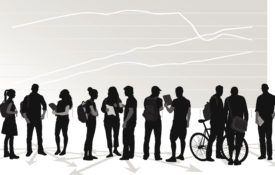-
A Growing Push to Treat Racism’s Impact on Mental Health
There’s an accelerating push by psychologists and psychiatrists to identify stress and trauma caused by racism—and develop interventions to address it. The move comes out of a growing recognition that the impact of racism on the mental health of Black people has often been ignored. This has led many patients to be undiagnosed, misdiagnosed or not adequately treated for their distress, doctors and therapists say. The most recent efforts are being led by a new generation of Black psychologists, psychiatrists and mental health advocates. Research has found a link between racism and psychological distress, anxiety, post-traumatic stress disorder and depression among Black people.
-
Is There Really a Covid Mental Health Crisis?
Back in the middle of March, I was pretty stressed out. Funnily enough it was the handwashing that got me; this was a few days before lockdown, and the real public health message had been wash your hands. So I washed them, dozens of times a day. My hands were raw and cracked, sometimes to the point of bleeding. They itched — burned — constantly. I was at every moment aware of this burning sensation, and it was an ever-present, unignorable reminder of how the world had changed. My six-year-old son’s hands were red and raw too, from his conscientious efforts at washing his hands at school.
-

Schooling Is Critical for Cognitive Health Throughout Life
Education provides little protection against the onset of cognitive declines but can boost the cognitive skills. [August 10, 2020]
-

New Research in Psychological Science
A sample of research on sexual decisions, interventions to improve educational outcomes, confidence in estimates, mindfulness and false memories, children’s stereotypes, and links between sound and meaning.
-
The Coronavirus Seems to Spare Most Kids From Illness, but Its Effect on Their Mental Health Is Deepening
Pandemics can be indiscriminate, with viruses making no distinctions among the victims they attack and those they spare. If you’re human, you’ll do. COVID-19 has been different, particularly when it comes to age. The disease has shown a special animus for older people, with those 65-plus considered at especially high risk for hospitalization and death, and those 18 and below catching a semblance of an epidemiological break. Though a small share of adolescents have suffered severe cases, most who contract the disease in that age cohort are likelier to experience milder symptoms or none at all. But if COVID-19 is sparing most kids’ bodies, it’s not being so kind to their minds.
-
Neuroscience Could Be the Key to Getting People to Wear Masks
OPINIONS ABOUT WEARING masks and maintaining social distancing are sharply divided, largely along red and blue lines. Conservatives Republicans are the least likely to wear a mask, according to poll data from Pew Research. Some neuroscientists believe that lessons from their field, applied appropriately, could help break the impasse and persuade more people to follow scientists’ recommendations. “A lot of these attitudes are really about your group identity,” says Elliot Berkman, a psychology professor at the University of Oregon studying neurological responses to public health messaging. “Face masks are political, but it's also about groups.

